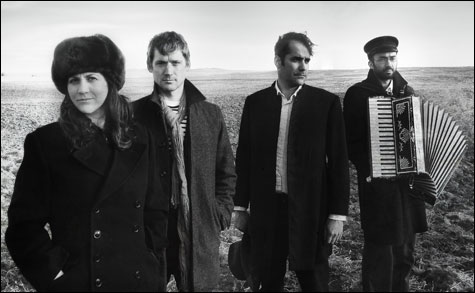
TAKE A CHANSON ME: DeVotchKa soak up the instrumentation of Gypsy camps and cabarets. |
Firewater’s Tod Ashley (a/k/a Tod A) and DeVotchKa’s Nick Urata — both of whom come to town this week with their respective groups — are pivotal figures in the neo-Balkan movement: an extensive network of bands (Gogol Bordello and Beirut among the best known) who’ve soaked up the exotic instrumentation of Eastern European villages, Gypsy camps, and smoky cabarets, then cross-pollinated it with rock, pop, and punk — to increasingly popular ends.
Ashley’s NYC-based Firewater have been at it since the mid ’90s (not long after the dissolution of his previous outfit, post-punk apocalyptics Cop Shoot Cop). Like so many other forefathers, Ashley has existed at the fringes of the scene he helped create, his band’s trailblazing efforts often overlooked amid the hype surrounding their descendants.

Count Urata and his Denver-based band among that successful progeny. Since debuting with the self-released Supermelodrama back in 2002, DeVotchKa have fed (and fed on) the trend, hitching their engaging bouzouki/accordion/sousaphone-fueled bazaar dreams to a busker’s resolve, and achieving a considerably higher profile. Non-stop touring and recording have swelled their following, as did DeVotchKa’s Grammy-nominated contributions to the Little Miss Sunshine soundtrack. A Mad & Faithful Telling (Anti-) — the group’s recently released fifth full-length, and their first since Sunshine thrust them into the spotlight — was one of this year’s most eagerly awaited discs.
But if circumstances have posited the two bandleaders at differing levels of recognition, both on their new albums are equally committed to pushing their sounds past the borders of Eastern Europe. Like indie-rock Jason Bournes, Ashley and Urata traverse the globe, acquiring sonic bits and pieces with which to flesh out their musical identities, staying one step ahead of everyone else.
Ashley’s journey was a literal one: a divorce, a severe bout of depression, and a seething hatred of George Bush drove him to leave the US in 2005 for a three-year trek through Thailand, India, Pakistan, Afghanistan, Israel, and Turkey. With a microphone and laptop, he wrote and recorded with dozens of musicians he encountered; The Golden Hour’s resultant cross-cultural constructs are entrancing. In what sounds like a klezmer band rocking a Peshawar banquet hall, insistent thickets of South Asian and Mediterranean percussion (chimta, dholki, dumbek) carry the guitars, harmonium, and Ashley’s sepulchral rasp in “This Is My Life.” And in the especially cinematic “A Place Not So Unkind” and “Feels like the End of the World,” the sinister twang of midnight-surf guitars blends with swaying Sufi melodies and bhangra rhythms to paint pictures of sweeping Khyber Pass vistas — an apt soundtrack for Ashley’s displaced disillusionment.
Urata’s passport might not be stamped with as many far-flung locales, but A Mad & Faithful Telling is all over the map. On opener “Basso Profundo,” Balkan strings tumble around norteño accordion, spaghetti-western guitars, and Italian folk melodies, until the whole thing transforms into a Yiddish-tinged wedding waltz. “Along the Way” brings in mariachi horns and strings straight out of an Esther Williams swim flick as Urata unleashes a warble that’s equal parts Morrissey, Orbison, and Byrne. “Undone,” with its mournful Spanish guitar, evokes the battle-scarred hills of Madrid; “Strizzalo” conjures the banks of the Seine with its playful squeezebox and xylophone. When in the sublime closer, “A New World,” Urata sings, “It’s the perfect day/We should get away,” he might just be talking about ditching Denver, but he speaks it like a true wandering Gypsy.
DEVOTCHKA + BASIA BULAT + FANCY TRASH | Paradise, 967 Comm Ave, Boston | May 18 | 617.562.8800 | FIREWATER + HARRIS | Paradise, 967 Comm Ave, Boston | May 23 | 617.562.8800